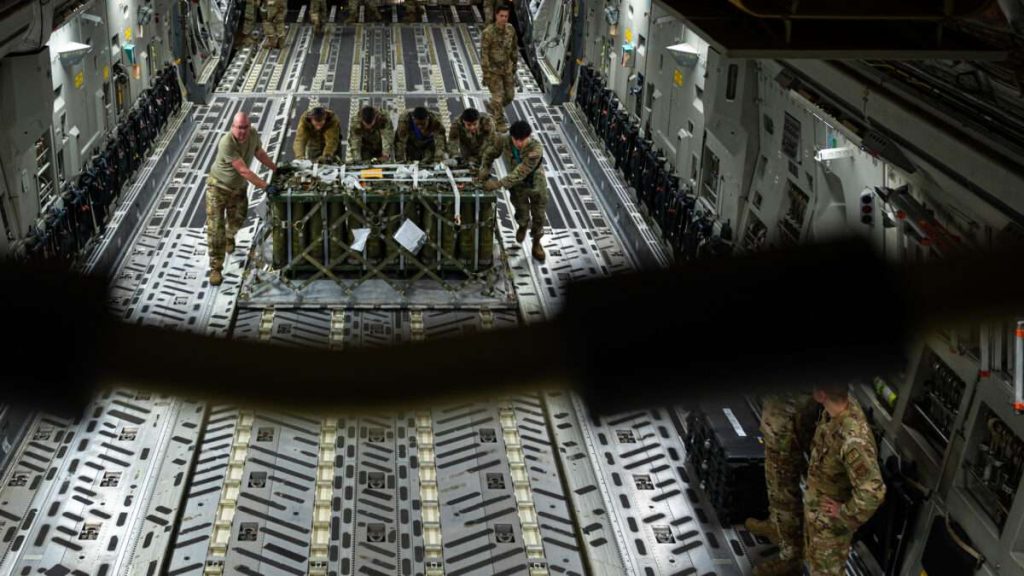It looks like Israel and Iran are going to war, and the United States might join in. Two weeks ago, Israeli forces bombed the Iranian consulate in Damascus, Syria, and killed seven Iranian military officers, including a general. Iran has vowed to respond, The Wall Street Journal reports that the U.S. government expects a direct Iranian attack on Israel over the weekend.
On Friday, the State Department issued travel restrictions for staff at the U.S. Embassy in Jerusalem, along with a warning about what to do in the event of rocket or artillery attacks. Iran has a variety of weapons that can reach Israel, from sophisticated ballistic missiles to cheap kamikaze drones.
By all accounts, the United States did not know about the Israeli attack on the Iranian consulate beforehand. (U.S. Secretary of Defense Lloyd Austin complained to the Israeli military about the lack of warning, The Washington Post reported.) Yet President Joe Biden has promised Israel “ironclad” support all the same.
“We’re going to do all we can to protect Israel’s security,” Biden said on Wednesday. His press secretary added the next day that “we warned Iran not to use this attack as a pretext to escalate further in the region or to attack U.S. facilities or personnel.”
Iran has issued its own warning: not to stand in the way. The Biden administration received an Iranian message claiming that U.S. forces will become a target if they stand in the way of Iran’s retaliation, according to The Intercept. A small number of U.S. troops are stationed in Israel for air defense and intelligence sharing missions. General Michael E. Kurilla, head of U.S. forces in the Middle East, is currently in Israel with them.
Iranian diplomats have had a flurry of meetings this week with foreign representatives urging Iran not to retaliate. Israel has also said that it will retaliate directly to any Iranian attack. But Iranian leaders are angry enough that they have talked themselves into a corner.
“When they attack the consulate, it is as if they have attacked our soil,” Iranian Supreme Leader Ali Khamenei said in a speech for the holiday of Eid al-Fitr on Wednesday. “The evil regime made a mistake and must be punished and it shall be.”
Israel has bombed Iranian troops in Iraq and Syria before, but Iran has written these attacks off as a loss. The difference seems to be that this month’s attack targeted a consulate. Attacking diplomatic facilities is considered a major red line in international law. Israeli army spokesman Daniel Hagari claimed that the Iranian consulate in Damascus was really a military base “disguised as a civilian building.”
Although the bombing of the consulate came as a surprise to everyone outside the Israeli leadership, the Israeli-Iranian conflict has been brewing for a long time. Over the past few years, Khamenei has called Israel a cancerous tumor that needs to be excised, and Israeli leaders have in turn said that Iran is an octopus they will behead.
Iran is a longtime supporter of Hamas, the group that rampaged through Israeli towns last October, sparking the current war in Gaza. The New York Times reported this week that Iran is now running guns to other Palestinian rebels in hopes of fomenting unrest across the Palestinian Territories.
And since the war in Gaza began, Israel has also been fighting a border war in Lebanon against the Iranian-backed militia Hezbollah. Israeli defense minister Yoav Gallant wanted to launch a full-scale attack on Lebanon early in the war, only to be talked down by the Biden administration.
So far, the United States has supported Israel’s war effort from a distance, providing weapons and intelligence. U.S. troops, with a few exceptions, have not directly been in the line of fire. The Biden administration has repeatedly insisted that it has “no plans or intentions to put U.S. boots on the ground in combat.”
But Biden is now letting Israel and Iran make that decision for him. Even though he was blindsided by the consulate attack, he has implied that the United States will absorb some of those consequences. Iran, meanwhile, is being vague about exactly what those consequences will be.
The news site Amwaj.media speculated that Iran could attack the Golan Heights, a territory that Israel captured from Syria in a 1967 war. Although Israel and the United States consider it Israeli territory, other countries consider the Golan to be occupied Syrian land, which might tone down the international reaction to Iran’s attack.
Pushing back on the speculation, an Iranian diplomatic source told Amwaj.media that he “doubts if anybody except for a few actually know” Iran’s next move. “These are all guesses.”
The post Will American Troops Be Sucked Into an Israeli-Iranian War? appeared first on Reason.com.







